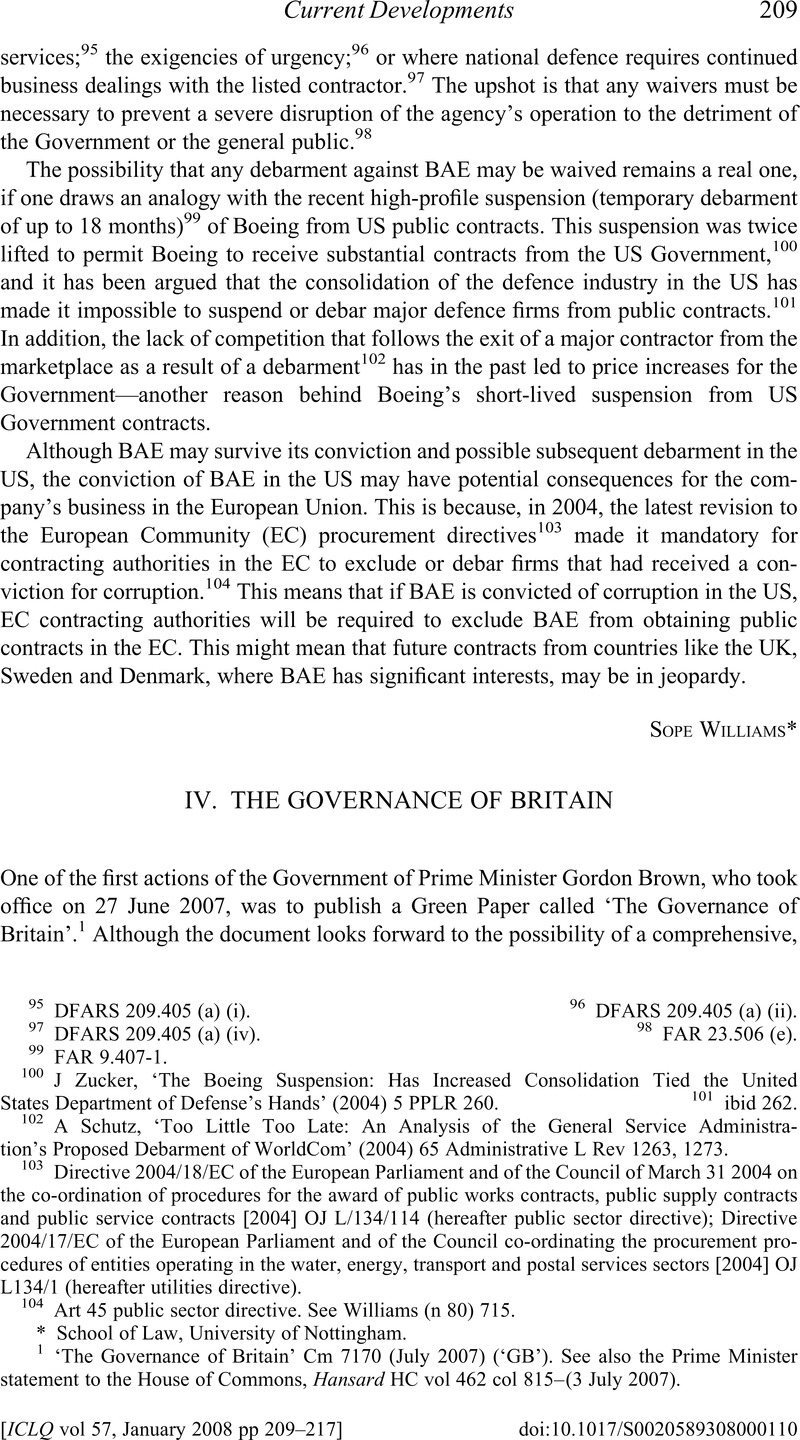PUBLIC INTERNATIONAL LAW
Published online by Cambridge University Press: 13 February 2008

1 ‘The Governance of Britain’ Cm 7170 (July 2007) (‘GB’). See also the Prime Minister statement to the House of Commons, Hansard HC vol 462 col 815–(3 July 2007).
2 GB para 213.
3 GB paras 14–19.
4 GB para 22, Box 2.
5 FA Mann, Foreign Affairs in English Courts (OUP, Oxford, 1986).
6 See S Talmon, ‘Recognition of Governments: An Analysis of the New British Policy and Practice’ (1992) 63 BYIL 231.
7 Council of Civil Service Unions v Minister for the Civil Service [1983] UKHL 6 (GCHQ).
8 RV Foreign Secretary Ex P Everett [1988] EWCA Civ 7.
9 On the saga of the Chagos Islanders, see S Allen, ‘Looking beyond the Bancoult cases: International Law and the Prospect of Resettling the Chagos Islands’ (2007) 7 Human Rights L Rev 441. The latest judgment is Secretary of State for Foreign and Commonwealth Affairs v R (Bancoult) [2007] EWCA 498.
10 See GCHQ (n 5), per Lord Roskill: ‘I do not think that that right of challenge can be unqualified. It must, I think, depend upon the subject matter of the prerogative power which is exercised … I do not think [some prerogative powers] could properly be made the subject of judicial review. Prerogative powers such as those relating to the making of treaties, the defence of the realm … are not, I think, susceptible to judicial review because their nature and subject matter is such as not to be amenable to the judicial process. The courts are not the place wherein to determine whether a treaty should be concluded or the armed forces disposed in a particular manner …’.
12 FCO Consultation on the UN Treaty on Jurisdictional Immunities of States.
13 Consultation of the International Criminal Court Bill, which had some impact on the International Criminal Court Act 2001.
14 Hansard HC vol 455 col 19 (8 Jan 2007).
15 Commons Select Committee on Public Administration, ‘Taming the Prerogative: Strengthening Ministerial Accountability’ (2004) HC 422. (The inquiry had started before March 2003.)
16 ‘Waging war: Parliament's role and responsibility’ Volume I: Report (2006) HL 236-I. I was the special adviser to the Committee on this matter. None of the material in this note should be taken to implicate the Committee in anyway and all information is based on public sources.
17 ‘Government's Response to the House of Lords Constitution Committee's Report’ (2006) Cm 6923.
18 ‘Waging War: Parliament's Role and Responsibility’. Follow-up (2007) HL 51. See also Hansard HL vol 691 col 979 (1 May 2007) and Hansard HC vol 460 col 481 (17 May 2007) for debates on the deployment power.
19 ‘The Governance of Britain’ (2007) HL158, para 4.
20 G Marston, ‘Armed Intervention in the 1956 Suez Canal Crisis: The Legal Advice Tendered to the British Government’ (1988) 37 ICLQ 773.
21 HC Constitutional Affairs Committee, ‘Constitutional Role of the Attorney General’ (2007) HC 306.
22 GB paras 52–6.
23 ‘The Governance of Britain: A Consultation on the Role of the Attorney General’ (2007) Cm 7192.
24 GB para 18.
25 GCHQ (n 12).
26 For a general account, see R Gardiner, International Law (Longman, London, 2003) ch 4. In particular, Kuwait Airlines v Iraqi Airlines (No 2) [2002] UKHL 19.
27 R v Horseferry Road Magistrates Court ex p Bennett [1994] AC 42.
28 For instance, on the deployment power, Campaign for Nuclear Disarmament v Prime Minister [2002] 2759.
29 For references, see ‘Waging War …’ (n 16) para 80. The latest is a private member's bill, Waging War (Parliament's Role and Responsibility) Bill, introduced by Michael Meacher MP in December 2006.
30 ‘Waging War …’ (n 16).
31 Lord Falconer, oral answers to questions 270 and 271, ‘Waging War …’, Vol II (2006) HL 236-II.
32 For the relevant documentation and detail, see ‘Freedom of Information Enforcement Notice’ and ‘Attorney-General's Office Disclosure Statement—Iraq Legal Advice’ (22 May 2006), <http://www.attorneygeneral.gov.uk/sub_disclosure_log_2006.html>.
33 GB para 29.
34 Lord Bramhall, answer to question 109, ‘Waging War …’ Vol II (n 31).
35 See P Sands, Lawless World (rev edn, Penguin, London, 2006) ch 12, ‘This Wretched Legal Advice’.
36 See ‘Waging War …’ (n 16) para 13.
37 CND (n 26) and R v Jones [2006] UKHL 16.
38 (n 23) paras 1.15, 2.3, 2,4.
39 Lord Morris of Aberavon, answer to question 210, ‘Waging War …’ Vol II (n 31).
40 ibid, question 238.
41 Minsiterial Code (2007) para 2.13.
42 For instance by Harriet Harman MP, then Minister for Constitutional Affairs, The Guardian (1 Feb 2007) 6.
43 ‘Waging War …’ Vol II (n 31) answer to question 242.
44 See (n 11) and C Warbrick, ‘Treaties: Recent Developments’ (2000) 49 ICLQ 944.
45 Bermingham and others (R on the application of) v Director of the Serious Fraud Office and the Home Secretary [2006] EWHC (Admin) 2000; see C Warbrick, ‘Recent Developments in UK Extradition Law’ (2007) 56 ICLQ 199.
46 For instance, the recent amendment to the UK's acceptance of the Optional Clause jurisdiction of the ICJ, see ‘UKMIL 2004’ (2004) 75 BYIL 803.
47 GB, para 33.
48 Notes 12 and 13.
49 ‘First Report, Protocol No 14 to the European Convention on Human Rights’ (2004) HL8/HC106.
50 ‘The Committee's Future Working Practices’ (2006) HL239/HC1575, para 68. On reservations to human rights treaties, see Lord Chancellor's Department, ‘Report on the UK's Inter-Departmental Review of the UK's position under various International Human Rights Instruments’ (2004) and JCHR, ‘Review of International Human Rights Instruments’ (2005) HL99/HC264.
51 ‘UKMIL 2005’ (2005) 76 BYIL 703.
52 M Hunt, Using Human Rights Law in English Courts (Hart Publishing, Oxford, 1997).
53 GB, para 49, n 13 (emphasis added). No concessions about the use of the power being contested in Bancoult (n 9).
54 ibid para 49.
55 ibid para 17.
56 Note 4.